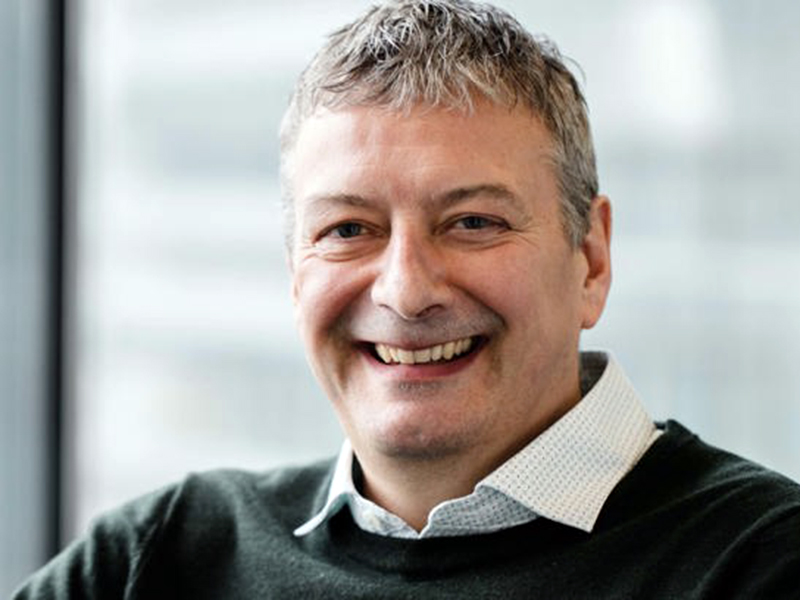I recall my first visit to our Glasgow North East Recovery Hub after taking the role of Chief Executive of WithYou in February.
I was greeted by a large, colourful collage made by our clients - and a dog named Bubbles, who belongs to our recovery worker Ronnie!
Marion, who was on reception, told me that her dad had been one of our first clients when the service opened in 2016. A few years later, she too became a client. They both went on to volunteer at the Hub and one of its rooms, the Stan Armstrong Suite, is named after her late father. It’s a lovely touch that underscores the sense of community in the place.
From singalongs to table tennis to fancy dress, there is always a buzz about the Hub. I can see why our clients love it here. As well as having one-to-one sessions with our professional recovery workers, receiving introductions to other organisations in the local area, and attending peer-led recovery groups, they can take part in arts and crafts and do a spot of gardening. It is a wonderful example of the difference effective services can make to both individuals and communities.
Graeme is one client currently supported by the Glasgow North East Recovery Hub. When I ask him about his experiences, he paints a bleak picture of alcohol dependency.
“I was very isolated,” he explains. “I would be sitting in one room in the house. The only time I would leave was to go and get alcohol. I lived my life from 10am to 10pm, due to Scottish licensing laws.
“A lot of the time I would wake up too early and I would have cravings. It would get to a certain time, 9.45pm, and I would have to rush to the shop to make sure I had enough alcohol to get through the night.”
Graeme was hospitalised many times before being diagnosed with alcohol-related pancreatitis at the age of just 34. That is when he reached out to WithYou.
Watch Graeme's story:
The latest statistics from the National Records of Scotland have revealed that there were 1,227 “alcohol-specific deaths” in Scotland in 2023. This came shortly after the publication of another set of statistics, which revealed that there were 1,172 “drug-related deaths” in the same period. I am incredibly proud of the role our WithYou services play in helping people like Graeme to - but these numbers speak for themselves.
Much more needs to be done to tackle this public health crisis. As my colleague Louise Stewart has said, we need to interrogate why so many people in Scotland use drugs and alcohol harmfully, and develop a strategy to improve the overall quality of life. Because the sad truth is that the National Records of Scotland reporting doesn’t include every death - and many more than 2,399 people will have lost their lives to substance use last year.
Last month in the Scottish Parliament, the Cabinet Secretary for Health and Social Care made a statement on the National Mission, which was announced in 2021 to reduce deaths and improve the lives of people impacted by drugs. It has now evolved to include alcohol; a decision that I do not agree with.
We know that harmful drug and alcohol use are both underpinned by deprivation and poor mental health. While there are absolutely similarities in some of the root causes and the way these substances can blight communities, there are significant differences in how we can address them.
Take, for example, the simple fact that alcohol is a legal substance. This means that advertising and availability are important considerations as we seek to reduce harms - and, indeed, much of last month’s conversation focused on branded pint glasses. These are considerations that don’t apply when we talk about drugs.
Alcohol-specific deaths have been steadily rising since 2019, and more lives were lost to alcohol than drugs in both 2022 and 2023. My fear is that, taken as part of the National Mission, alcohol policy will not be given the space and attention it so desperately needs. A standalone strategy is required so that the Scottish Government can tackle harmful alcohol use with greater determination and innovation.
In his statement, the Cabinet Secretary said that UK clinical guidelines for alcohol treatment are “forthcoming”. I hope to see these published with urgency - then properly resourced and reinforced by health and social care partnerships. This will help to ensure people receive a choice of treatment, as well as access to timely and appropriate support, wherever they are in Scotland.
Ensuring timely, effective alcohol support services are available in communities across Scotland is important because, with the right support, people can recover. Graeme is testament to this. He has been in recovery for more than four months and is now volunteering with the groups that helped him.
“Once I knew that it was starting to affect my health, I knew that I had to stop,” he continues. “I thought I was leaving things behind. I thought, ‘if I don’t drink, what else am I going to do? I’m not going to have a life’. When I asked for help it was the best thing I’ve ever done.”
Simon Phillips is Chief Executive of WithYou
Anyone who is worried about their drinking or that of a loved one is encouraged to get in touch with WithYou. As well as delivering services in communities, the charity offers a free and confidential webchat. This is a great first point of contact for anyone who is worried about their alcohol use or that of a loved one. Visit wearewithyou.org.uk today.







